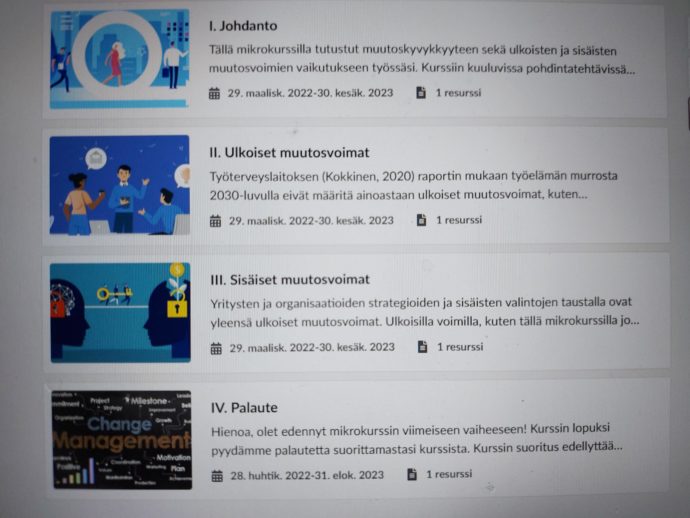The ESF-funded ‘MUUVO Skills as a driving force’ project (2021-2023) promotes change management and green transition processes of small and medium-sized enterprises through micro-courses and tailored coaching. The project will bring micro-learning to the workplace and offer employees the opportunity to take short-term courses in an online learning environment during the working day to strengthen their skills. Micro-courses deal with sustainable development, the green transition, corporate responsibility, change management, competence development and self-management. The content of the courses and related exercises provide inputs for company-specific coaching. The first training and coaching processes of the MUUVO project started in pilot companies in Vantaa, Finland, in May 2022.

The transformation of work means new skills requirements and continuous retraining for the personnel of companies. These days the ongoing development of one’s professional skills is increasingly every employee’s own responsibility. For this, employees need support and encouragement from their employer and work community. (Launikari & Simon 2022). In general, lack of time and finding a suitable way to support learning are often bottlenecks in companies for developing the skills of their personnel (Launikari & Hario 2021). A better understanding of the learning needs of working adults will be required so that their participation in continuous learning can be supported and ensured. (Laurea University of Applied Sciences 2022).
The MUUVO project is based on the ever-changing skills needs in the labour market that require employees to quickly embrace new things and regularly update their skills. Micro-learning and related coaching are a natural and flexible way to keep one’s own skills up to date in working life. The training and coaching concept based on micro-learning developed in the project will be piloted in companies in the Uusimaa region during 2022-2023. The aim is to strengthen the philosophy of continuous learning in their staff development.
Micro-learning means slicing and dicing the learning contents into smaller parts
Micro-learning refers to pedagogy, in which the lesson to be learnt is divided into several short and small parts. People are not usually made to absorb unlimited amounts of new information in training sessions running for many hours. Therefore, for micro-learning the content is broken into pieces that can be quickly and effortlessly adopted. ‘Sliced and diced’ learning is an excellent way to use a person’s learning capacity efficiently and appropriately. However, the prerequisite for micro-learning is that the pieces are smoothly available. It is possible to achieve a learning objective defined as specific knowledge or skills by completing the contents of micro-learning. (Peters 2021).
Micro-learning responds directly to the skills needs that arise from the real life, eliminating irrelevant and unnecessary content from learning. In micro-learning, learners can complete self-study courses at their own pace (duration e.g. 15-30 minutes). Learning can take place just when it suits the learner best, such as during a lunch or coffee break, while commuting on public transport, sitting on a park bench or at their own workstation at home or at the office. When learning takes place in the middle of an ordinary working day, new things are likely to naturally become part of what has been learnt earlier.
Modern technology enables micro-learning in a completely new way, although it is not intended to completely replace traditional face-to-face learning situations. A computer and a smartphone bring flexibility to micro-learning. At its best, micro-learning utilises a wide range of content formats that support different ways of learning and offers the opportunity to internalise the topic easily to diverse learners. It is possible to learn and absorb the materials being studied by listening to a podcast, reading a blog post, watching videos, playing games and doing related exercises. (Leino 2021).
Micro-learning is not a ’panacea’ that is automatically suitable for studying all possible things. Large and multidimensional entities may not be optimal for micro-learning, as in terms of understanding them, physical presence and interaction with the teacher and other students tend to improve learning outcomes. On the other hand, it is possible to learn simple tasks or get to know new topics in a more superficial manner with micro-learning.
Micro-courses provided by the MUUVO project
During the spring and early summer of 2022, the MUUVO project consortium, which includes the Laurea University of Applied Sciences, the Metropolia University of Applied Sciences and the City of Vantaa, will produce a total of 30 web-based micro-courses on the following themes for the needs of companies:
- sustainable development;
- green transition
- corporate responsibility
- change management
- competence development and
- self-management.
 Figure 1. Content and structure of the micro-course ‘The basics of change management’.
Figure 1. Content and structure of the micro-course ‘The basics of change management’.
Each micro course on an online platform called Itslearning contains 3-4 separate modules, each of which takes about 10-15 minutes to make. In this case, it takes on average about an hour to complete one micro-course. The figure 1 shows, for example, the content and structure of the micro-course called ‘The basics of change management’ and the specific exercises. The structure is modular and is divided into four parts. Part 1 is an introduction to the subject, part 2 presents the external drivers of change, part 3 presents the internal drivers of change, and in part 4 the person completing the micro-course gives feedback on it and evaluates what s/he received from the learning experience.
A tailor-made plan will be agreed upon with companies participating in MUUVO’s training and coaching activities. The plan outlines which micro-courses the staff members will complete, and how the contents and themes of the micro-courses will be integrated to the company-specific coaching process. Employees take the micro-courses independently within a given timeframe, usually a couple of weeks. The coaching is geared towards bringing the lessons learnt from the micro-courses into the company’s business and development activities.
MUUVO’s training and coaching concept will be piloted in companies in Vantaa, Finland, starting in May 2022. More companies from other municipalities in the Uusimaa region will participate in the project in the autumn of 2022. Articles and blogs to be published later on will explain in more detail what experiences have been gained and lessons learnt from the MUUVO training and coaching activities offered to companies.
You can learn more about the ‘MUUVO Skills as a driving force’ project at https://muuvo.fi/
Original text in Finnish and translation into English: Mika Launikari, Laurea University of Applied Sciences (original text published 2.6.2022)
Bibliography:
- Launikari, M. & Hario, P. 2021. Työnantajat ja digitalisaatio – Digiosaaminen on perustaito 2020-luvun työelämässä. [Employers and digitalisation – Digital skills are a basic skill in working life in the 2020s]. Consulted 19 May 2022. https://journal.laurea.fi/tyonantajat-ja-digitalisaatio-digiosaaminen-on-perustaito-2020-luvun-tyoelamassa/#b6a96218
- Launikari, M. & Simon, H. 2022. Digitaalisuus, osaaminen ja työelämä – Kokonaisvaltaista tukea työllistymiseen. [Digitalisation, skills and working life – Holistic support to becoming employed]. Consulted 18 May 2022. https://www.theseus.fi/handle/10024/743653
- Laurea-ammattikorkeakoulu 2022. Uudella osaamisella kasvuun: Urbaania kasvua Vantaa -hankkeen ratkaisuja pk-yrityksille. [Towards growth with new skills: Solutions to companies by the Urban Growth Vantaa project]. Consulted 19 May 2022. https://urbaaniakasvua.fi/wp-content/uploads/2022/03/Uudella-osaamisella-kasvuun_Laurean-erillisjulkaisu_080322.pdf
- Leino, K. 2021. Näin teet koukuttavia opetussisältöjä – 10+1 vinkkiä. [This is how you create learning content that hooks – 10+1 tips]. Consulted 19 May 2022. https://www.paperplanes.fi/blogi/nain-teet-koukuttavia-opetussisaltoja/
- Peters, K. R. 2021. The Definitive Guide to Microlearning – The what, why, and how-to guide to leveraging microlearning. Consulted 18 May 2022. https://www.valamis.com/documents/10197/822927/microlearning-guide.pdf